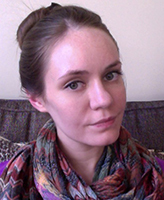
Charlotte Cunningham, a psychology graduate student in Notre Dame’s College of Arts and Letters, was awarded a graduate research fellowship from the National Science Foundation (NSF) for the 2014-15 academic year.
The NSF Graduate Research Fellowship Program recognizes and supports outstanding students in science, technology, engineering, mathematics, and social science disciplines who are pursuing research-based degrees. The award provides an annual stipend, tuition support, and opportunities for international research and professional development for three years.
“The Graduate Research Fellowship Program is a stiff, national competition to identify the most promising doctoral students in the country,” said Daniel Lapsley, professor and chair of the Department of Psychology. “We have been extraordinarily successful, with five of our students landing a fellowship in the last three years. Each of our doctoral program areas has had at least one student earn one, and this is strong evidence of the high quality of our students and their faculty mentors.
Allison Gaffey, a Ph.D. student in the clinical psychology program, was the first to earn this distinction in 2012. The department had three winners last year: developmental psychology student Caroline Byrd, cognitive psychology student Enmanuelle Pardilla-Delgado, and quantitative psychology student Patrick Miller.
“Our latest winner, Charlotte Cunningham, is also in the quantitative psychology program, and her proposal outlines a highly promising research program on multilevel modeling, longitudinal data, and missing data analysis,” Lapsley said.
Cunningham said she was surprised and honored to receive the recognition. “To have the NSF give its stamp of approval and say, ‘we think you’re good. You’re going to be able to do something.’ That’s really nice.”
In her research, she is working to develop methods to analyze within-person variability—or the fluctuations that can occur in psychological states such as memory or affect over time.
“I first started looking at longitudinal data in my undergraduate studies, and I realized that it is a very powerful tool,” Cunningham said. “You can learn so much about the patterns and growth of changes over time.
“For aging populations and people with neurodegenerative diseases and psychological disorders, this kind of data is really valuable for understanding what’s happening.”
One of the greatest benefits of the NSF fellowship, she said, is that she will now have access to the NSF computer cluster, allowing her to run simulations even more efficiently.
As she prepared her application, Cunningham participated in an NSF Graduate Research Fellowship workshop offered by The Graduate School’s Office of Grants and Fellowships. She also credited her faculty adviser, Assistant Professor Peggy Wang, with supporting her throughout the process.
The outstanding faculty members in Notre Dame’s quantitative psychology program were the reason she chose the University, Cunningham said.
“Every single faculty member specializes in a different area, so there is a wealth of knowledge here,” she said. “Overall, my experience at Notre Dame has been great.”
Originally published by at psychology.nd.edu on March 02, 2015.